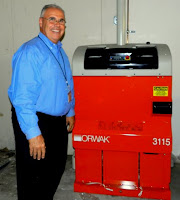A ripened fruit in the proverbial "low hanging fruit tree" is plastic film recycling. Considered a contaminant in single-stream recycling systems, plastic film is landfill destined in most commercial operations, especially at small to moderate generators. Most large generators source-separate their operating by-products, including plastic film, for sale within the commodity markets.
 |
Scott Lutocka of Piazza Produce
sitting on a bale of plastic film
|
Ei's plastic film journey began in 2011 when Simon Property Group joined the Ei Partner Program. Synchronistic with Ei and Simon joining forces, the garment manufacturing industry shifted from bulk retail packaging to individual item packaging. RESULT: a tremendous increase in valuable, clean, virgin plastic film going into retailer waste streams. The ZWA Blog post, Simon Property Group Embarks on Zero Waste Initiatives, chronicles the first Simon plastic film recycling meeting during Matt Hupp's - then Simon director of waste & recycling - second Atlanta visit.
In the same time frame Hilex Poly, a global leader in plastic bag manufacturing, and Orwak, a small baler manufacturer, joined the Ei Program. In the next months, Concord Mills - a Simon mall - accepted the invitation to serve as the Sustainable Food Court Initiative Event Venue Pilot. The necessary players were in-place to create a shopping mall plastic film recycling template!
 |
Ray Soporowski. Concord Mills
GM, happy @ program launch
|
In simplistic terms, the city-wide game plan is to recruit 10 - 12 industry pioneers who generate a moderate amount of plastic film in their operations. Using a small baler, the pioneers collect and bale plastic film on-site for periodic collection. A local hauler collects and delivers the small bales to a warehouse. The small bales are re-baled into standard size larger bales and stored in an empty tractor trailer. Once full, the plastic film is sold by the tractor trailer load as a raw material to a plastic bag manufacturer. Atlanta serves as the pilot city for the plastic film recycling template.
Within the city-wide template, challenges abound:
 |
plastic film ready for
the baling process
|
- Bottom line improvement - Ei commits to programs that make solid business sense for the entire value chain. For the generator, the baler and additional labor investment must be covered by reduced landfill tipping costs and material rebates. Route density is key to minimize transportation costs for the hauler.
- Commodity market volatility - Fluctuations in commodity market prices create instability and undue risk within a program.
- Small baler infrastructure - As with most markets, Atlanta is void of existing haulers capable of efficient small bale collection.
- Limited storage - Frequent collection is required as most generators have limited storage areas. Timing the collection routes to meet varying logistical requirements requires team effort among the template participants.
- Varying plastic film types - The template participants represent a variety of industries, each with a unique mix of plastic film types generated. It is necessary to determine the balance between bale value and energy required to create maximum value among the various film types.
- Maximizing plastic film tonnage - To justify transporting the tractor trailer to the manufacturer, a minimum of 37,000 pounds of plastic film must fill the trailer. As close as possible to the 44,000 pounds capacity is necessary to maximize value chain benefit.
- Small bale size - Small bales pose three challenges: 1> looser compaction yields lower pounds per bale, 2> inefficient stacking in the trailer results in lower pounds per trailer load, and 3> additional unloading labor at the manufacturer due to increased number of retrievals for fewer pounds.
 |
| The first plastic film recycling meeting with FreshPoint |
For the Atlanta pilot, a stellar team of Ei Partners and Supporters are working together to unravel the challenges into a well-structured yet flexible template staged for duplication. The committed team includes:
- M-Pass - a recycling and materials management consulting company- serves as the pilot foundation. Lorraine White, M-Pass founder & president, plans to use M-Pass assets to collect, re-bale and store the plastic film at her warehouse during the pilot.
- Orwak - manufacturer of small balers - agrees to provide a complimentary baler for 90 days at the pilot launch.
- FreshPoint - national produce distributor with an Atlanta distribution center - accepts the pilot baler with the agreement to welcome fellow template participants for baler demonstrations.
- Hilex Poly - a global leader in plastic bag manufacturing - contracts with M-Pass to purchase the baled plastic film by the tractor trailer load at a consistent price.
Additional pilot participants are in the introductory stage with anticipated commitments in the near future.
The city-wide plastic film recycling template is in the midst of the creative chaos necessary to bring forth the solid structure within a successful program. Ei founder Holly Elmore knows this energy state well as the creator of the Zero Waste Zones and the Sustainable Food Court Initiative. A common phrase Holly uses during this stage is "If it was easy, it would already be done!"